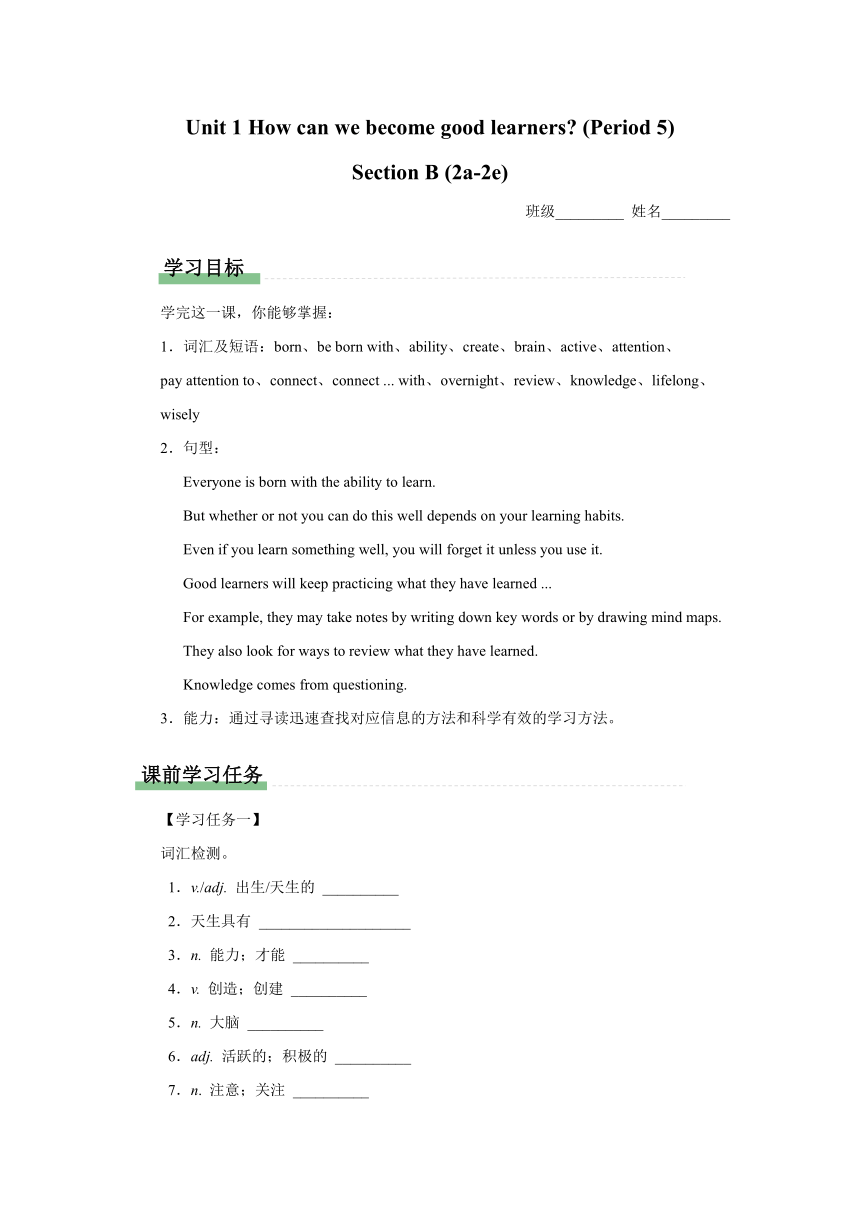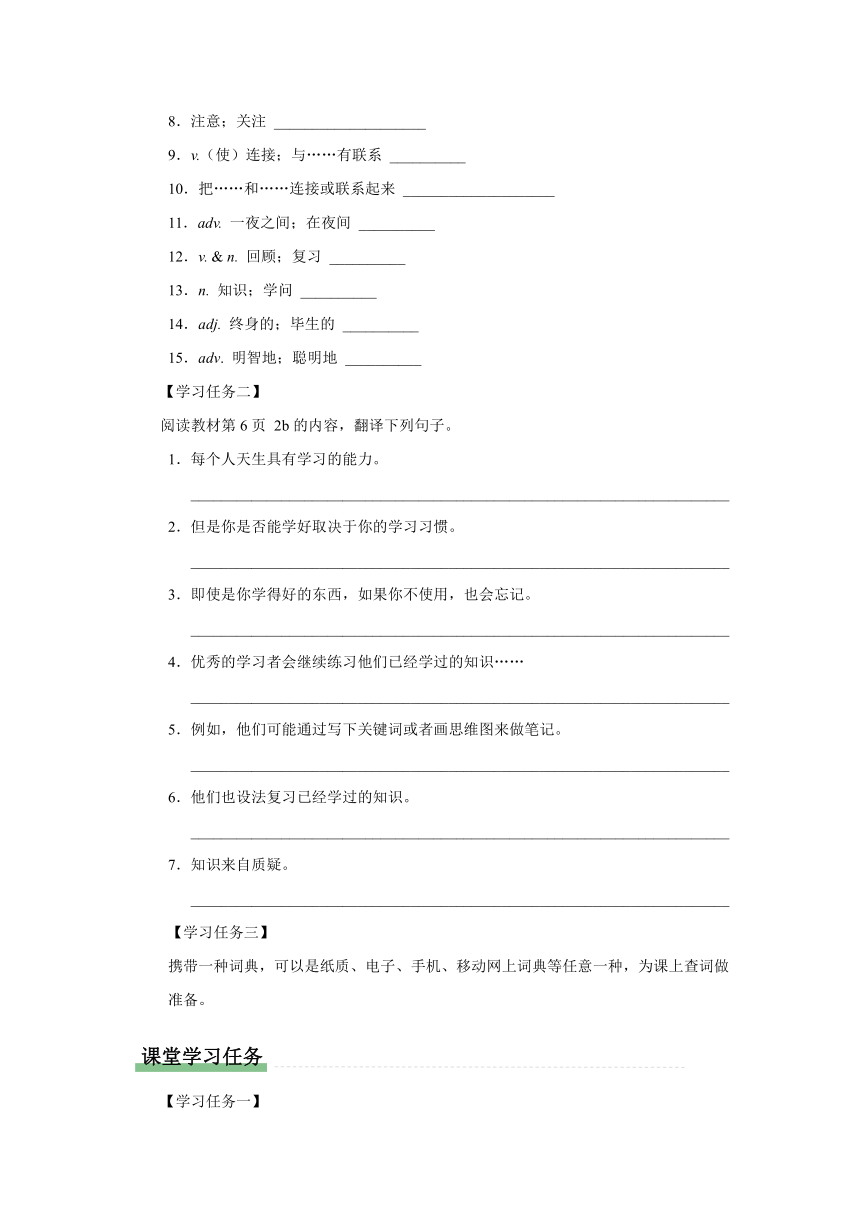Unit 1 How can we become good learners?Section B (2a-2e) 预习导学 人教版英语九年级全册(无答案)
文档属性
| 名称 | Unit 1 How can we become good learners?Section B (2a-2e) 预习导学 人教版英语九年级全册(无答案) |

|
|
| 格式 | docx | ||
| 文件大小 | 358.4KB | ||
| 资源类型 | 教案 | ||
| 版本资源 | 人教新目标(Go for it)版 | ||
| 科目 | 英语 | ||
| 更新时间 | 2023-10-04 00:00:00 | ||
图片预览



文档简介
Unit 1 How can we become good learners (Period 5)
Section B (2a-2e)
班级_________ 姓名_________
学完这一课,你能够掌握:
1.词汇及短语:born、be born with、ability、create、brain、active、attention、
pay attention to、connect、connect ... with、overnight、review、knowledge、lifelong、
wisely
2.句型:
Everyone is born with the ability to learn.
But whether or not you can do this well depends on your learning habits.
Even if you learn something well, you will forget it unless you use it.
Good learners will keep practicing what they have learned ...
For example, they may take notes by writing down key words or by drawing mind maps.
They also look for ways to review what they have learned.
Knowledge comes from questioning.
3.能力:通过寻读迅速查找对应信息的方法和科学有效的学习方法。
【学习任务一】
词汇检测。
1.v./adj. 出生/天生的 __________
2.天生具有 ____________________
3.n. 能力;才能 __________
4.v. 创造;创建 __________
5.n. 大脑 __________
6.adj. 活跃的;积极的 __________
7.n. 注意;关注 __________
8.注意;关注 ____________________
9.v.(使)连接;与……有联系 __________
10.把……和……连接或联系起来 ____________________
11.adv. 一夜之间;在夜间 __________
12.v. & n. 回顾;复习 __________
13.n. 知识;学问 __________
14.adj. 终身的;毕生的 __________
15.adv. 明智地;聪明地 __________
【学习任务二】
阅读教材第6页 2b的内容,翻译下列句子。
1.每个人天生具有学习的能力。
_______________________________________________________________________
2.但是你是否能学好取决于你的学习习惯。
_______________________________________________________________________
3.即使是你学得好的东西,如果你不使用,也会忘记。
_______________________________________________________________________
4.优秀的学习者会继续练习他们已经学过的知识……
_______________________________________________________________________
5.例如,他们可能通过写下关键词或者画思维图来做笔记。
_______________________________________________________________________
6.他们也设法复习已经学过的知识。
_______________________________________________________________________
7.知识来自质疑。
_______________________________________________________________________
【学习任务三】
携带一种词典,可以是纸质、电子、手机、移动网上词典等任意一种,为课上查词做
准备。
【学习任务一】
2a: What good learning habits can you think of Make a list and discuss them with your partner.
1._____________________________________________________________ 2._____________________________________________________________ 3._____________________________________________________________ 4._____________________________________________________________ 5._____________________________________________________________
【学习任务二】
观察2b标题和图片,回答问题。
How Can You Become a Successful Learner
What is the passage about
__________________________________________________________________________
【学习任务三】
迅速阅读2b文章,摘录文中所列优秀学生采取的四种学习方式。
1._______________________________________________________________________
2._______________________________________________________________________
3._______________________________________________________________________
4._______________________________________________________________________
【学习任务四】
2c: Read the passage again and answer the questions.
1.Does the writer think that everyone is born with the ability to learn well Do you agree Why or why not
_______________________________________________________________________
_______________________________________________________________________
_______________________________________________________________________
2.Why is it a good idea to connect something you need to learn with something you are interested in
_______________________________________________________________________
_______________________________________________________________________
3.What do the sayings “Use it or lose it” and “Practice makes perfect” mean Do you agree with them
_______________________________________________________________________
_______________________________________________________________________
_______________________________________________________________________
4.Do good learners learn from mistakes, or are they afraid of making mistakes
_______________________________________________________________________
5.What study skills does the writer talk about Do you have those study skills
_______________________________________________________________________
_______________________________________________________________________
_______________________________________________________________________
6.Do you agree that learning is a lifelong journey Why or why not
_______________________________________________________________________
【学习任务五】
根据2b文章完成下列思维导图。
【学习任务六】
2d: Write a sentence for each word.
e.g. brain: A good way to train the brain is to do some math exercises every day.
connect v. ________________________________________________________
overnight adv. ___________________________________________________________
attention n. _________________________________________________________
review v. _________________________________________________________
knowledge n. _________________________________________________________
ability n. _________________________________________________________
active adj. ___________________________________________________________
wisely adv. ___________________________________________________________
【学习任务七】
小组活动:讨论有效的学习方法,形成小组观点并记录下来。
___________________________________________________________________________
___________________________________________________________________________
___________________________________________________________________________
___________________________________________________________________________
___________________________________________________________________________
【学习任务八】
小组探究:
1.be born with 表示“_______________”,be born in/on 表示“_______________”,其中 born 是动词。born 还可以作________(词性),意为“天生的”,作定语修饰名词。
2.短语_______________表示“视……而定;取决于;依靠;依赖;相信”,后接名词、代词、动词________形式或宾语从句。
3.forget 及物动词,意为“忘记”,其反义词是________。
forget to do sth.“忘记去做某事”,表示事情________(已做/未做)。
forget doing sth.“忘记做过某事”,表示事情________(已做/未做)。
表示“遗忘”时,________(forget/leave)通常与表示地点的状语连用。
4.unless 连词,意为“除非;如果不”,引导________状语从句,相当于短语________,在许多情况下两者可以互换。
5.用含有keep的短语翻译下列汉语。
一直/继续做某事 ________________ 让某人一直做某事 ________________
阻止某人做某事 ________________
6.观察下面两个例句,尝试总结for example和such as的区别。
There are some other problems. For example, we don’t have enough time.
People in many countries speak English, such as Canada and America.
举例形式 标点符号 句中位置
for example
such as
7.选择填空(find/find out/look for)。
____________ “寻找”,强调寻找的动作和过程,是有目的地找
____________ “找到;发现”,通常指找到或发现具体的东西,也可指偶然发现某物或某种情况,强调结果
____________ “找到;发现”,通常指找到或发现具体的东西,也可指偶然发现某物或某种情况,强调结果
8.观察例句,分别写出句中question对应的词性及释义。
They are questioning the witness (目击者). ( ____ ________ )
He always asks some strange questions. ( ____ ________ )
根据本课所学内容,列出关键词或画出你的思维导图吧!
1.根据2b内容,仿照给出的例子,完成表格。
Habits How good learners do Proofs Examples
Creating an interest. Often connect what they need to learn with something interesting. Your brain is more active; It’s easier to pay attention to it for a long time. Listen to English songs or watch English sports programs.
2.根据上述完成的表格,简要复述2b课文。
Section B (2a-2e)
班级_________ 姓名_________
学完这一课,你能够掌握:
1.词汇及短语:born、be born with、ability、create、brain、active、attention、
pay attention to、connect、connect ... with、overnight、review、knowledge、lifelong、
wisely
2.句型:
Everyone is born with the ability to learn.
But whether or not you can do this well depends on your learning habits.
Even if you learn something well, you will forget it unless you use it.
Good learners will keep practicing what they have learned ...
For example, they may take notes by writing down key words or by drawing mind maps.
They also look for ways to review what they have learned.
Knowledge comes from questioning.
3.能力:通过寻读迅速查找对应信息的方法和科学有效的学习方法。
【学习任务一】
词汇检测。
1.v./adj. 出生/天生的 __________
2.天生具有 ____________________
3.n. 能力;才能 __________
4.v. 创造;创建 __________
5.n. 大脑 __________
6.adj. 活跃的;积极的 __________
7.n. 注意;关注 __________
8.注意;关注 ____________________
9.v.(使)连接;与……有联系 __________
10.把……和……连接或联系起来 ____________________
11.adv. 一夜之间;在夜间 __________
12.v. & n. 回顾;复习 __________
13.n. 知识;学问 __________
14.adj. 终身的;毕生的 __________
15.adv. 明智地;聪明地 __________
【学习任务二】
阅读教材第6页 2b的内容,翻译下列句子。
1.每个人天生具有学习的能力。
_______________________________________________________________________
2.但是你是否能学好取决于你的学习习惯。
_______________________________________________________________________
3.即使是你学得好的东西,如果你不使用,也会忘记。
_______________________________________________________________________
4.优秀的学习者会继续练习他们已经学过的知识……
_______________________________________________________________________
5.例如,他们可能通过写下关键词或者画思维图来做笔记。
_______________________________________________________________________
6.他们也设法复习已经学过的知识。
_______________________________________________________________________
7.知识来自质疑。
_______________________________________________________________________
【学习任务三】
携带一种词典,可以是纸质、电子、手机、移动网上词典等任意一种,为课上查词做
准备。
【学习任务一】
2a: What good learning habits can you think of Make a list and discuss them with your partner.
1._____________________________________________________________ 2._____________________________________________________________ 3._____________________________________________________________ 4._____________________________________________________________ 5._____________________________________________________________
【学习任务二】
观察2b标题和图片,回答问题。
How Can You Become a Successful Learner
What is the passage about
__________________________________________________________________________
【学习任务三】
迅速阅读2b文章,摘录文中所列优秀学生采取的四种学习方式。
1._______________________________________________________________________
2._______________________________________________________________________
3._______________________________________________________________________
4._______________________________________________________________________
【学习任务四】
2c: Read the passage again and answer the questions.
1.Does the writer think that everyone is born with the ability to learn well Do you agree Why or why not
_______________________________________________________________________
_______________________________________________________________________
_______________________________________________________________________
2.Why is it a good idea to connect something you need to learn with something you are interested in
_______________________________________________________________________
_______________________________________________________________________
3.What do the sayings “Use it or lose it” and “Practice makes perfect” mean Do you agree with them
_______________________________________________________________________
_______________________________________________________________________
_______________________________________________________________________
4.Do good learners learn from mistakes, or are they afraid of making mistakes
_______________________________________________________________________
5.What study skills does the writer talk about Do you have those study skills
_______________________________________________________________________
_______________________________________________________________________
_______________________________________________________________________
6.Do you agree that learning is a lifelong journey Why or why not
_______________________________________________________________________
【学习任务五】
根据2b文章完成下列思维导图。
【学习任务六】
2d: Write a sentence for each word.
e.g. brain: A good way to train the brain is to do some math exercises every day.
connect v. ________________________________________________________
overnight adv. ___________________________________________________________
attention n. _________________________________________________________
review v. _________________________________________________________
knowledge n. _________________________________________________________
ability n. _________________________________________________________
active adj. ___________________________________________________________
wisely adv. ___________________________________________________________
【学习任务七】
小组活动:讨论有效的学习方法,形成小组观点并记录下来。
___________________________________________________________________________
___________________________________________________________________________
___________________________________________________________________________
___________________________________________________________________________
___________________________________________________________________________
【学习任务八】
小组探究:
1.be born with 表示“_______________”,be born in/on 表示“_______________”,其中 born 是动词。born 还可以作________(词性),意为“天生的”,作定语修饰名词。
2.短语_______________表示“视……而定;取决于;依靠;依赖;相信”,后接名词、代词、动词________形式或宾语从句。
3.forget 及物动词,意为“忘记”,其反义词是________。
forget to do sth.“忘记去做某事”,表示事情________(已做/未做)。
forget doing sth.“忘记做过某事”,表示事情________(已做/未做)。
表示“遗忘”时,________(forget/leave)通常与表示地点的状语连用。
4.unless 连词,意为“除非;如果不”,引导________状语从句,相当于短语________,在许多情况下两者可以互换。
5.用含有keep的短语翻译下列汉语。
一直/继续做某事 ________________ 让某人一直做某事 ________________
阻止某人做某事 ________________
6.观察下面两个例句,尝试总结for example和such as的区别。
There are some other problems. For example, we don’t have enough time.
People in many countries speak English, such as Canada and America.
举例形式 标点符号 句中位置
for example
such as
7.选择填空(find/find out/look for)。
____________ “寻找”,强调寻找的动作和过程,是有目的地找
____________ “找到;发现”,通常指找到或发现具体的东西,也可指偶然发现某物或某种情况,强调结果
____________ “找到;发现”,通常指找到或发现具体的东西,也可指偶然发现某物或某种情况,强调结果
8.观察例句,分别写出句中question对应的词性及释义。
They are questioning the witness (目击者). ( ____ ________ )
He always asks some strange questions. ( ____ ________ )
根据本课所学内容,列出关键词或画出你的思维导图吧!
1.根据2b内容,仿照给出的例子,完成表格。
Habits How good learners do Proofs Examples
Creating an interest. Often connect what they need to learn with something interesting. Your brain is more active; It’s easier to pay attention to it for a long time. Listen to English songs or watch English sports programs.
2.根据上述完成的表格,简要复述2b课文。
同课章节目录
- Unit 1 How can we become good learners.
- Section A
- Section B
- Unit 2 I think that mooncakes are delicious!
- Section A
- Section B
- Unit 3 Could you please tell me where the restroom
- Section A
- Section B
- Unit 4 I used to be afraid of the dark.
- Section A
- Section B
- Unit 5 What are the shirts made of?
- Section A
- Section B
- Review of Units 1-5
- Unit 6 When was it invented?
- Section A
- Section B
- Unit 7 Teenagers should be allowed to choose their
- Section A
- Section B
- Unit 8 It must belong to Carla.
- Section A
- Section B
- Unit 9 I like music that I can dance to.
- Section A
- Section B
- Unit 10 You're supposed to shake hands.
- Section A
- Section B
- Review of Units 6-10
- Unit 11 Sad movies make me cry.
- Section A
- Section B
- Unit 12 Life is full of the unexpected
- Section A
- Section B
- Unit 13 We're trying to save the earth!
- Section A
- Section B
- Unit 14 I remember meeting all of you in Grade 7.
- Section A
- Section B
- Review of Units 11-14
